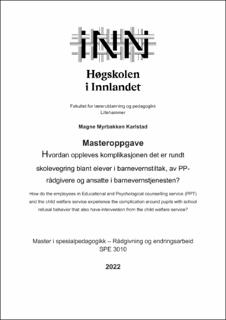| dc.contributor.advisor | | |
| dc.contributor.author | Karlstad, Magne Myrbakken. | |
| dc.date.accessioned | 2022-09-20T16:11:05Z | |
| dc.date.available | 2022-09-20T16:11:05Z | |
| dc.date.issued | 2022 | |
| dc.identifier | no.inn:inspera:111599403:31588816 | |
| dc.identifier.uri | https://hdl.handle.net/11250/3019328 | |
| dc.description.abstract | Bakgrunn og formålet:
De involverte instansene kan meddele om en opplevelse av økende tendenser til skolefravær, spesielt av typen de definerer som problematisk skolefravær (Havik, 2018a). Gjennom forskning og opplevelser vet vi at problematisk skolefravær, også kalt skolevegring, kan føre til konsekvenser som oppleves av både individet med også familien rundt. Mye forskning viser til at mye fravær i tidlig alder kan føre til mulig frafall fra videregående opplæring (Havik, 2018a; b). Hva skjer så hvis elever med barnevernstiltak, som også fører til at elever i mindre grad fullfører videregående opplæring? Oppgavens formål er nettopp det å belyse problematikken rundt det å se på skolevegring for elever med barnevernstiltak gjennom skildringer av opplevelser fra ansatte i PPT og Barnevernstjenesten.
Deres skildringer skal sees på i lys av motivasjonsteori av Bandura og Antonovskys tanker om Sense of coherence (OAS).
Problemstilling:
For å besvare det som kommer frem i oppgaven har jeg valgt å benytte meg av problemstillingen som lyder:
Hvordan oppleves komplikasjonen det er rundt skolevegring blant elever i barnevernstiltak, av PP-rådgivere og ansatte i barnevernet?
Metodikk og datanalyse:
Den valgte metoden for å besvare problemstillingen ble gjennom kvalitativ metode, gjennomført gjennom intervju av 4 informanter, fordelt på 2 ansatte i PP-tjenesten og 2 i barnevernstjenesten. De informantene som svarte på spørsmålene fikk selv valget om å delta eller ikke, og alle valgte på bakgrunn av at de hadde erfaringer om nevnt problematikk.
Resultater:
Gjennom informantenes svar kan man se at det er en opplevelse av at det er en vanskelig problemstilling å arbeide med. Informantene kunne skildre opplevelser av at gruppen elevere både hadde motivasjon og ikke hadde motivasjon til skolen, men også den store variasjonen det er mede hva som er bakgrunnen til vegringen og hva som er de riktige tiltakene for å få de tilbake til skolen. Samtlige av informantene meddeler viktigheten av å arbeide med det individuelle, men også arbeidet rundt det arbeidet man kan gjøre med miljøet rundt der barn og unge ferdes. Det resultatene kan medbringe er et behov for mer fokus og retningslinjer innenfor begrepet skolevegring, og gjerne med tilleggsvansker, i form av det som man vet er faktorer som spiller inn på elevers motivasjon og hverdagsmestring. | |
| dc.description.abstract | The background and purpose:
The instances I chose to have with in the master thesis can report an experience of increasing tendencies towards school absenteeism, especially of the type that is defined as problematic school absenteeism (Havik, 2018a). Through research and experiences, we know that problematic absenteeism, also called school refusal behavior, can lead to further consequences for both the individual and the surrounding family. A lot of research indicates that a lot of absence at an early age can lead to possible drop-out from high school (Havik, 2018a; b). So what happens if pupils and students with child welfare measures, which is also a factor for pupils to complete high school in lesser extent, also has problems with school refusal? That’s what this thesis is all about, shed the light on the problem of school refusal behavior among pupils that also receives child welfare measures through descriptions of the experience employees in the Educational and Psychological counselling service (PPT) and the employees in the child welfare service. Their descriptions are seen in the light of the motivational theory of Bandura and Antonovsky´s Sense of coherence (SOC/OAS).
The research question:
To answer the statements and what emerges in the research, I have chosen the research question which reads:
How do the employees in Educational and Psychological counselling service (PPT) and the child welfare service experience the complication around pupils with school refusal behavior that also have intervention from the child welfare service?
Methodology and data analysis:
The method I have chosen to answer the research question is through qualitative method, conducted through interviewing 4 informants, divided between 2 employees from each of the mention services. All the informants were given the choice to participate or not, but all chose to participate on behalf of their experience about the topic.
Results:
Through the informants´ answers, it can be seen that it is seen as a difficult problem to work with. And the informants described experiences of both pupils and students with and without motivation for school. They also described the great variation in the background the school refusal behavior and the variation of the measures to get them back to school. And all of the informants mention communication as an important part of the work with the individuals, but also the changes in environment around the youngsters that can have an impact to if they start to show school refusal behavior or not. What the results can show is that it is a possibility need for more focus and guidelines within the concept of school refusal, and often with additional difficulties, in the form of what is known to be factors that can affect students´ motivation and a feeling of mastering their everyday life. | |
| dc.language | nob | |
| dc.publisher | Inland Norway University | |
| dc.title | Hvordan oppleves komplikasjonen det er rundt skolevegring blant elever i barnevernstiltak, av PP-rådgivere og ansatte i barnevernstjenesten? | |
| dc.type | Master thesis | |
